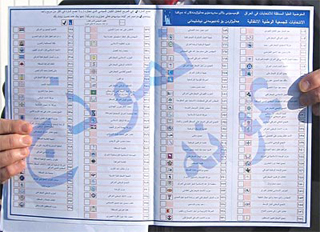-

-
Courses
Find courses by:
Collections
Cross-Disciplinary Topic Lists
- About
- Donate
- Featured Sites
This is an archived course. A more recent version may be available at ocw.mit.edu.

A ballot used in the January 2005 Iraqi election. (Photo courtesy of the United States State Department.)
Prof. Chappell Lawson
17.50
Fall 2006
Undergraduate
This class first offers some basic analytical frameworks - culture, social structure, and institutions - that you can use to examine a wide range of political outcomes. We then use these frameworks to understand (1) the relationship between democracy and economic development and (2) the relative centralization of political authority across countries. We will use theoretical arguments and a wide range of case studies to address several questions: Why are some countries democratic and others not? How does democracy affect economic development and political conflict? Why do some countries centralize power while others threaten to fall apart through secession and civil war? We will use examples from a wide range of countries including Argentina, Brazil, Germany, Iraq, Italy, Mexico, and the United States. The lessons drawn from these countries will prepare you to analyze other countries of your own choosing in the paper assignments. At the end of the course, you should be able to analyze political events around the world, drawing on the theoretical explanations provided in the class.
Chappell Lawson. 17.50 Introduction to Comparative Politics, Fall 2006. (Massachusetts Institute of Technology: MIT OpenCourseWare), https://ocw.mit.edu (Accessed). License: Creative Commons BY-NC-SA
For more information about using these materials and the Creative Commons license, see our Terms of Use.
